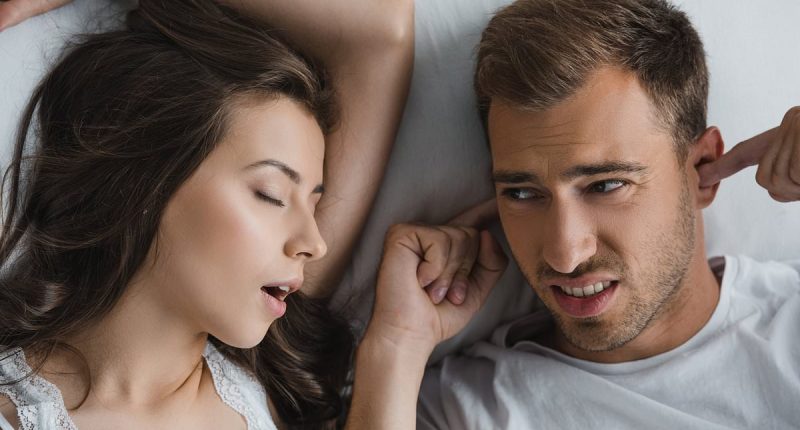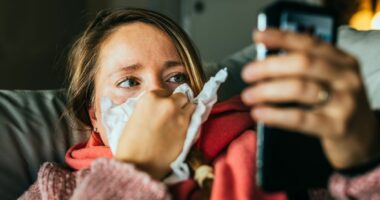Share this @internewscast.com
Experts have raised the alarm over the viral sleep trend of taping the mouth shut in a bid to encourage deeper breathing and, as a result, a better night’s rest.
While the fad may have gained popularity among celebrities such as Gwyneth Paltrow and Tess Daly, it deprives wearers of life-giving oxygen overnight, experts from Canada have found.
By analysing 10 studies on the practise, scientists at the Lawson Research Institute discovered an alarming risk of potentially fatal suffocation for millions who naturally breathe more easily through their mouth.
This is common in those with allergies and even a cold or runny nose, whereby the nasal passages are blocked.
Four of the studies the researchers looked at found evidence of the life-threatening risk of suffocation, also called asphyxiation, which means the body is deprived of oxygen.
What’s more, the analysis showed the trend was useless in relieving snoring or sleep apnoea.
‘Mouth taping is a contemporary practice that is often celebrity-endorsed, but is not necessarily scientifically accurate,’ Dr Brian Rotenberg, an ENT specialist and author of the study, explained.
‘Many people are not appropriate for mouth taping, and in some cases it can lead to risk of serious health harm.’

Strictly Come Dancing’s Tess Daly has said mouth taping ‘encourages nose breathing for a deeper, more restful sleep
Mouth taping involves securing the mouth shut with adhesive tape, across the lips, before going to sleep, forcing the wearer to breathe through their nose.
This, proponents of the practice believe, is what leads to benefits, as snoring is typically caused by tongue vibrations that happen when people breathe through their mouth.
Advocates also say breathing through the nose can help protect against bugs, as it triggers the production of a compound called nitric oxide, which acts as a defense mechanism against pathogens we inhale.
Nitric oxide has also been shown to relax blood vessels, lower blood pressure and even support kidney function.
However, researchers found that in 80 per cent of the studies, there was no evidence that mouth taping helped treat mouth breathing or snoring overnight.
Just two of the studies suggested that people with mild obstructive sleep apnoea may benefit slightly from the practice.
This common condition, which affects around 1.5million people in the UK, occurs when the walls of the throat relax and narrow or close during sleep, blocking the upper airway.
This can interrupt breathing, causing sufferers to wake suddenly throughout the night and has been linked to an increased risk of heart disease and dementia.

Sleep apnoea can lead to serious health issues, including high blood pressure, increased stroke risk, type 2 diabetes, heart disease and depression.
Most concerning was the risk of asphyxiation, the researchers said.
People who suffer from rhinitis—which occurs when the inside of the nose becomes irritated, causing a blocked or runny nose—allergies, or have a deviated septum, are more likely to experience breathing difficulties when using mouth tape, they warned.
On the basis of these findings, Dr Rotenberg and his colleagues are confident that existing evidence does not support mouth taping as an effective treatment for snoring or sleep apnea.
However, the researchers note, further research is needed to ascertain whether mouth-taping provides other health benefits.












